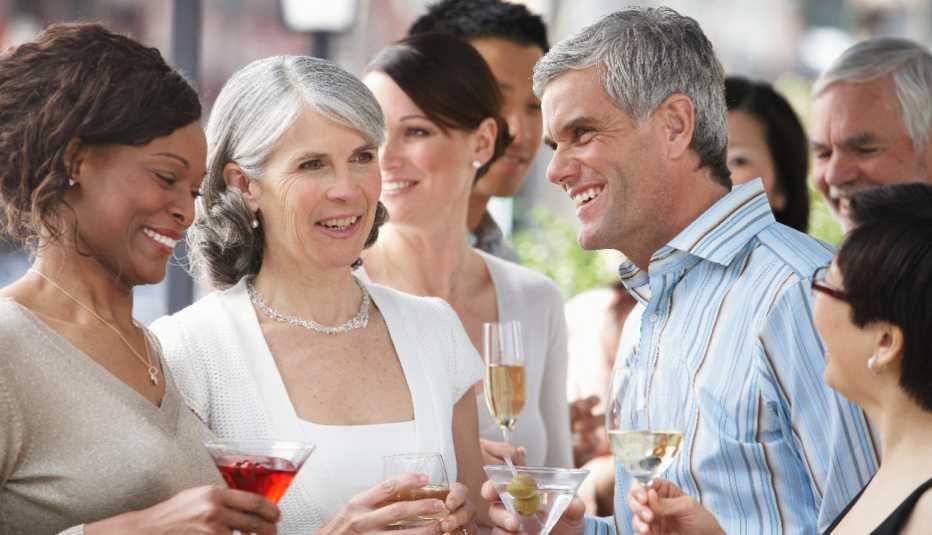AARP Hearing Center


Maybe you felt your drinking was getting out of control or you got tired of the hangovers. Regardless of why you've decided to stop drinking, you may worry about whether your wine-connoisseur or beer-chugging pals will still want to socialize with you — will they still think you're fun? — now that you've decided to cut alcohol from your life. And you may not feel like explaining to certain people exactly why you're sipping sparkling water rather than your usual gin and tonic.
Experts suggest a few strategies for how to handle (and hopefully even enjoy) social situations where drinking's a focus when you're newly sober.
1. Start with a personal pep talk
“Before the event, examine your reasons for not drinking,” advises Donna Cornett, founder and director of Drink/Link Moderate Drinking Programs in Santa Rosa, Calif. Take five or 10 minutes to focus on them and psych yourself up: Are you having health problems? Did your doctor tell you to stop? Do you feel too tipsy after one or two drinks? Is your relationship at stake because you argue when you drink? Were you endangering yourself or others? “Get yourself motivated to say, ‘Yes, I'm going to do this tonight,'” says Cornett.
2. Make a plan
Think through your strategy for the event — everything from how long you'll stay to what you'll drink instead of alcohol to what you'll say if someone asks why you don't want a glass of wine or tries to push something stronger on you. “Peer pressure to drink is incredible,” Cornett says. (See sidebar for suggestions on easy ways to respond to questions about your sobriety.) The more prepared you are, the more comfortable you'll be.
3. Choose a nonalcoholic beverage
Want a beer? Some easy responses:
- “No, thanks. I'm cutting down on calories."
- “I'm the designated driver."
- “My doctor thinks I should cut back for health reasons."
- “I have to get up really early tomorrow, so I'm not drinking tonight."
- “I have a headache and am steering clear tonight.”
- “I feel better when I'm not drinking."
If people are insistent — “Come on, just have one!” — Koob suggests turning the tables by asking, “Does my not drinking make you uncomfortable?”
Once you arrive, order or pour yourself an alcohol-free drink, recommends George F. Koob, director of the National Institute on Alcohol Abuse and Alcoholism (NIAAA) at the National Institutes of Health (NIH) in Bethesda, Maryland. That way you have something in your hand — club soda with lime, nonalcoholic beer — and won't invite questions about whether you want a drink.
4. Tune in to what's happening beyond yourself
This will help you take your mind off alcohol and any discomfort you're feeling, Cornett says: “You'll forget about the drink obsession if you focus on what's happening and the conversation around you.”
5. Enjoy the hors d'oeuvres
Eating gives you something to do with your hands and is another way to be involved socially with the event.
6. Call a friend if you need support
This could be your Alcoholics Anonymous (AA) sponsor or anyone who cares about you and your effort to stay sober, says Koob.
For expert tips to help feel your best, get AARP’s monthly Health newsletter.



































































More on Health
9 Signs You May Have a Drinking Problem
Ask yourself these questions about your alcohol useHow to Help Someone Who Drinks Too Much
Expert advice on confronting and assisting a friend or family member who's abusing alcohol
Get the Facts on Women and Alcohol
Why heavier drinking can be bad news for their health and well-being